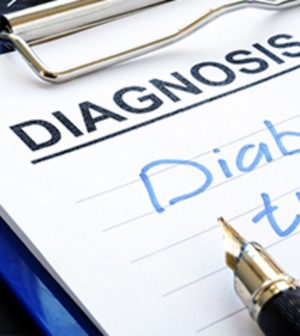- Could Your Grocery Store Meat Be Causing Recurring UTIs?
- Are You Making This Expensive Thermostat Error This Winter?
- Recognizing the Signs of Hypothyroidism
- 10 Strategies to Overcome Insomnia
- Could Artificial Sweeteners Be Aging the Brain Faster?
- Techniques for Soothing Your Nervous System
- Does the Water in Your House Smell Funny? Here’s Why
- Can a Daily Dose of Apple Cider Vinegar Actually Aid Weight Loss?
- 6 Health Beverages That Can Actually Spike Your Blood Sugar
- Treatment Options for Social Anxiety Disorder
Eating Disorders Common in People With Type 1 Diabetes

One in every four people age 16 or older with type 1 diabetes may be struggling with an eating disorder, a new review of data on the subject finds.
Type 1 diabetes is an autoimmune disorder in which the body attacks its own insulin-producing cells in the pancreas, making a person reliant on injected insulin. About 5% of diabetes cases are type 1.
The new study was led by doctoral student researcher Pia Niemelä of the University of Eastern Finland. Her team looked at data from 45 studies involving nearly 11,600 people with type 1 diabetes.
They found that over 2,500 patients — almost 1 in every 4 — also exhibited symptoms of an eating disorder.
That’s not overly surprising, the Finnish team said, since weight gain is a concern for many people with type 1 diabetes. People with the illness can exhibit symptoms like binge eating or cutting back on food intake, but some also practice a form of disordered eating called “insulin omission.”
This practice — skipping insulin doses — is thought to discourage weight gain, but it can be very unhealthy.
“Intentional skipping or restriction of insulin doses will lead to weight loss, but this also maintains high blood glucose, throwing the management of diabetes off balance,” Niemelä said in a university news release.
The study found that women with type 1 diabetes were more prone to eating disorders than men, but age didn’t seem to matter.
“Eating disorder symptoms are often thought to affect adolescents and young adults,” Niemelä said. “However, our meta-analysis shows that adults, too, suffer from eating disorder symptoms, which is why it is important to learn to identify patients with eating disorders.”
She stressed that developing an eating disorder can encourage complications and worsening illness in people with type 1 diabetes. Certain screening methods can help doctors pick up signs of eating disorders in patients, however.
The study was published in the April issue of Eating Disorders.
More information
Find out more about connections between type 1 diabetes and eating disorders at JDRF.
SOURCE: University of Eastern Finland, news release, May 8, 2024
Source: HealthDay
Copyright © 2026 HealthDay. All rights reserved.










